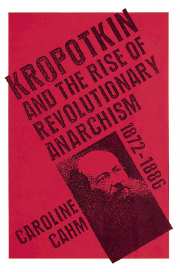Book contents
- Frontmatter
- Contents
- Preface
- Acknowledgements
- Introduction
- Part I Kropotkin and the development of the theory of anarchist communism
- 1 Bakuninism
- 2 Anarchist communism
- Part II Kropotkin and the development of anarchist ideas of revolutionary action by individuals and small groups (1872–1886)
- Part III Kropotkin and the development of anarchist views of collective revolutionary action (1872–1886)
- Conclusion
- Notes
- Bibliography
- Index
- Frontmatter
- Contents
- Preface
- Acknowledgements
- Introduction
- Part I Kropotkin and the development of the theory of anarchist communism
- 1 Bakuninism
- 2 Anarchist communism
- Part II Kropotkin and the development of anarchist ideas of revolutionary action by individuals and small groups (1872–1886)
- Part III Kropotkin and the development of anarchist views of collective revolutionary action (1872–1886)
- Conclusion
- Notes
- Bibliography
- Index
Summary
From reform to revolution: 1872 Kropotkin's first contact with the International and bakuninism
‘I soon noticed that no revolution whether peaceful or violent had ever taken place without the new ideals having clearly penetrated into the very class whose economical and political privileges were to be assailed’. So Kropotkin observed when he first embarked on his career as a revolutionist. No one could have been more truly a member of the privileged class than Kropotkin himself.
In 1862, when twenty years old, he graduated as an officer from the exclusive military academy, the Corps of Pages at St Petersburg, after serving with some distinction as personal page to the Tsar himself. At this point his loyalty had not been in question. Indeed, just before the passing out ceremony he had taken a leading part in extinguishing a dangerous fire started by an arsonist in the centre of St Petersburg. Yet rather than pursue the possibility of a brilliant career at court he elected to serve in a newly created and virtually unknown regiment in a remote region of Siberia. Revolted from his boyhood by a system where the nobility maintained an extravagant and useless existence based on serfdom, he had expected a radical improvement in the social system when the new Tsar liberated the serfs in 1861. By 1862 it was becoming clear to him that this was a vain hope; signs of a coming reaction already began to manifest themselves in the behaviour of Alexander II, particularly after the fire.
- Type
- Chapter
- Information
- KropotkinAnd the Rise of Revolutionary Anarchism, 1872-1886, pp. 17 - 35Publisher: Cambridge University PressPrint publication year: 1989

